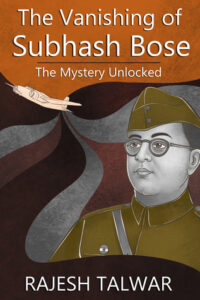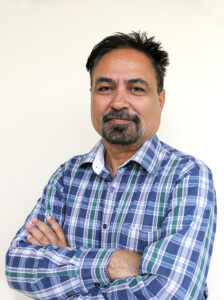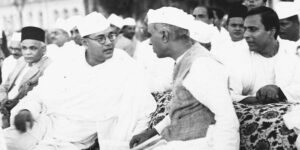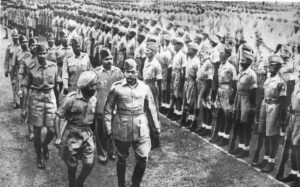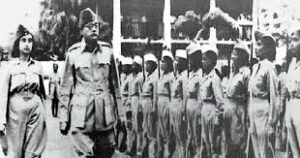Mystery behind Bose’s death finally unlocked
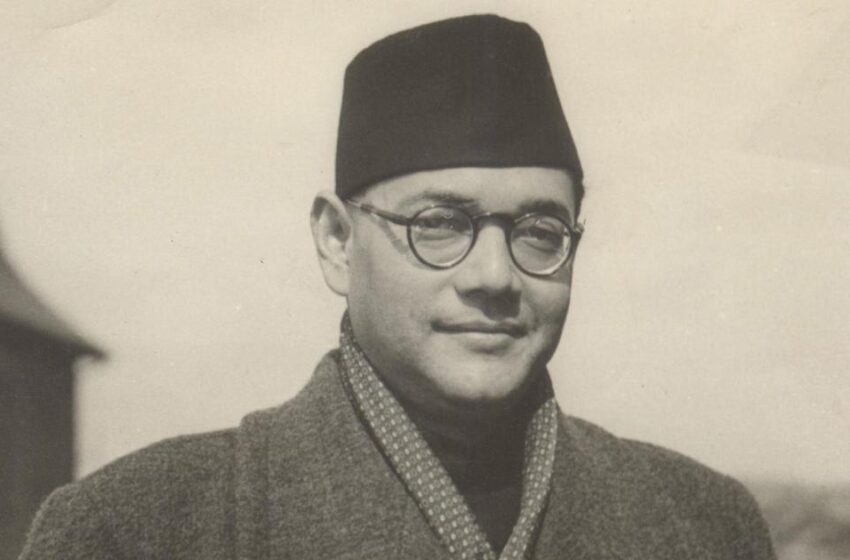
As the nation kick-starts the year-long celebrations of the 125th birth anniversary of NETAJI SUBHASH CHANDRA BOSE today (Jan 23, 2021), we bring you an interview with author RAJESH TALWAR who clears the air about Bose’s alleged death in an air crash, stating it all to be a made-up story in his book, The Vanishing of Subhash Bose: The Mystery Unlocked (Kalpaz Publications; Rs 250; 210 pages)
SAURABH TANKHA
What made you pen a book on a subject talked about for decades and numerous books written on it?
A book on Subhash Chandra Bose’s disappearance, and his relevance and that of the Indian National Army (INA) had been brewing in my mind for a long while, which is one reason, I suppose, to speak in a lighter vein, why readers might find it to be a heady cocktail. Since my childhood, Bose and the INA have fascinated me. My great grandfather Sardar Kripa Ram fought for the British Indian Army, and we have with us a photograph of him with US President Eisenhower, but his son, my great-uncle, Bhisham Chopra, served in the INA. I grew up with memories of this somewhat mysterious elderly figure in the family, who had fought for our Independence.
In 2007, there was fanfare about an all-women Indian contingent who arrived in Liberia to support the work of the UN Mission. I felt proud, but also sad because I couldn’t help thinking of other brave women who were not honoured. In particular, I remembered a middle-aged Muslim taxi driver on a trip to Myanmar who showed me photographs of his grandmother who lost her life fighting for the Rani of Jhansi Regiment. It was a remarkable anti-colonial battle these brave women from all faiths fought for our Independence, some barely out of their teens, and I can’t think of any equivalent anywhere in the world at the time – and yet the fearless warriors had been ignored.
In her book, In Search of Freedom, writer Sagari Chhabra has carried out wonderful interviews of INA fighters and their family members. A narrator speaks of how Netaji visited Indian families in Malaysia and asked parents of willing daughters to give permission for their child to join the INA for the cause of our Independence. Can you imagine what it must have cost those parents in emotional terms to send one of their daughters to the battlefield? Can you imagine the spirit of those young girls? It enrages me that the Indian government did not deem it fit to honour such patriots for decades. It is almost as if they had never existed, or if they did, they had vanished or disappeared.
‘It enrages me that the Indian government did not deem it fit to honour such patriots for decades. It is almost as if they had never existed, or if they did, they had vanished or disappeared’
In my book, the term ‘vanishing’ can be understood at two levels. The first, most obvious and correct interpretation of the expression, is the issue of the alleged air crash at Taipei and Subhash Bose’s subsequent disappearance. What happened to Bose if there was no air crash? How did he simply vanish? There is, however, a deeper meaning. There has also been a ‘vanishing’ or erasure of Bose and the INA in terms of our collective memories of their priceless contribution to the independence we take so much for granted these days.
There are many reasons I consider my book to be necessary despite there being so many books on Bose. One of the important arguments made in the book is that we must give due credit to Bose and the INA while simultaneously honouring Gandhi and the Congress stalwarts of the time. There is enough credit to be shared. It is sign of pettiness to try and examine whose contribution was greater. Leaving aside this issue of competitive patriotism, the book is important because it clearly demonstrates that as far as Bose’s alleged death in an air crash was concerned, it was all a made-up story.
I write in my book on how Nehru would have made a great professor of English. The prime minister was a lover of the arts. He was fond of reading history, literature and poetry. He loved going to theatre. He was a great man in his own right, with his own immense contributions and sacrifices for the country. But whatever his motives may have been, he actually succeeded in directing a major theatre production in real life even as he fulfilled his considerable duties as prime minister. That play was titled The Death in an Air- crash of Subhash Chandra Bose. Although an Indian production, it received technical assistance from the British and the Japanese. It had a large cast with over a hundred actors, many of them from Japan. It was an ambitious project although the script had its crucial flaws.
‘Nehru would have made a great professor of English. The prime minister was a lover of the arts. He was fond of reading history, literature and poetry. He loved going to theatre. He was a great man in his own right, with his own immense contributions and sacrifices for the country. But whatever his motives may have been, he actually succeeded in directing a major theatre production in real life even as he fulfilled his considerable duties as prime minister’
The Mousetrap, a famous English play, based on an Agatha Christie novel, has been running in a British theatre for 60 years, and is considered to be the world’s longest running play. The play staged by Nehru has been running for as much time, but people have not noticed. Perhaps it is now time for the curtains to finally fall.
How different is your narrative from other authors?
Extremely different. There are several things that are new or special about this book. First, (and my legal background of being a trained international lawyer has helped here) there is a careful analysis of all three inquiries into Bose’s alleged disappearance which has never been attempted before. In particular the first report known as the Shah Nawaz Committee, the majority verdict which came to the conclusion that Bose had died in an air crash is meticulously and logically ripped apart.
Both Western and Indian historians have been overly, and to my mind, extremely unfairly, dismissive of the dissenting report written by Suresh Bose, Subhash’s real brother. The book explains how Suresh Bose’s report was in fact an excellent one, far superior in content and reasoning to the majority verdict. In the early chapters, I demonstrate beyond a shadow of a doubt that PM Nehru was hiding something; there were things he knew but did not share with the people. This was also the reason why the Bose family was under surveillance for decades with all mails being intercepted by the Intelligence Bureau, something that is a matter of historical record and shame.
‘I demonstrate beyond a shadow of a doubt that PM Nehru was hiding something; there were things he knew but did not share with the people’
In your opinion, what exactly happened – did Netaji die in that crash?
There should not be a shred of doubt in anyone’s mind that there was no crash at Taipei on the alleged date. The government of Taiwan has itself categorically denied that there was any air crash on the date in question. I have been to Taiwan where I have visited their museums and libraries. One of the many great attributes of the Taiwanese is their meticulous record keeping. It is easy enough to prove that a crash took place, but how does one go about proving that an air crash did not take place. During his visit to Taipei, Justice Mukherjee requested officials of the Taipei City Government to furnish the records on the basis of which they gave out that there was no plane crash on August 18, 1945. The Commission was informed that the assertion was based on the fact that there was no report of any such accident in contemporary newspaper accounts kept in their archives.
Taiwan is a rich and developed nation and like other such nations they have enough money to spend on the preservation of records. Newspapers from the period in question were microfilmed, preserved and made available to anyone interested in reading them – unlike the case here, where the Netaji papers were only released after many decades. Justice Mukherjee did not take the assertions made by the Taiwanese at face value. He paid a visit to the Institute of Taiwanese History and after a perusal of the microfilmed daily newspapers was able to satisfy himself that there was no report of any plane crash on August 18, 1945.
To demonstrate its thoroughness, the Taiwanese government pointed out how even news of far lesser importance relating to Netaji’s family was published in their paper, the Central Daily News in its issue dated September 14, 1945 – not long after the date of the alleged air crash. This clearly demonstrates how Subhash Chandra Bose was a well-known personality there. The relevant portion of the said news item, when translated in English, reads as under: –
Central Daily News, 14 September, 1945
The Indian government decided today to release the younger brother(s) and family of Bose who were detained since the beginning of the Japanese war. The members belonging to the Bose family (clan) who opposed the Government of India will also be set free. The official announcements states, ‘In view of the Japanese surrender, there is no need for detaining these people for long time.’
Consider the following scenario. Let us assume, God forbid, that a prominent British politician dies in a road accident in New Delhi. No news of this is published, but a few days later The Times of India publishes a story about his relatively unknown brothers and sisters in England! Would it not be fair for anyone to conclude in such a case that there was no accident, and that it was a cock and bull story?
Or take another example. A Bollywood actress gets married in a public ceremony. Is it credible that such prominent news would not be reported in any Indian newspaper, but the marriage in the Maldives, of her distant cousin, a relatively unknown person is reported? Is it possible that the Taiwanese media would report on the arrest or release of Bose’s family in India, but not report on Bose’s death in an air crash in their own country’s capital?
Again, how does one prove that a crash never took place short of filming the space 24×7? The onus clearly has to be on those who assert that a crash took place at the date, time and location in question. One more thing. That the Taiwanese were clearly meticulous in their research is evident from the fact that they do refer to another crash a little over a month after the alleged air crash in which Bose died. According to one email from the Taiwanese authorities, there was no air crash during that period while another email makes a reference to a crash on September 20-23, 1945, involving a US C-47 transporter plane carrying 26 people, most of them believed to be former American POWs just released from camps in the Philippines.
So, to put it in simple words, there was no air crash in Taipei on the date in question, and so the question does not arise of Subhash Bose, or anyone else for that matter, to have died in it.


